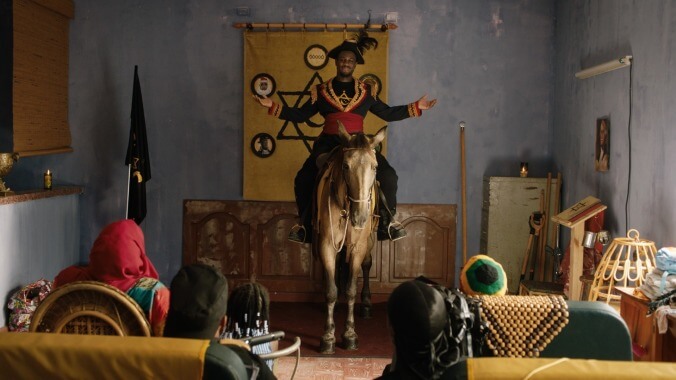The Day Shall Come is another harrowingly funny terrorism comedy from the director of Four Lions


The frustrations humming just beneath the surface of The Day Shall Come, the bitter and bracingly funny new political satire from British dark-comedy master Chris Morris, are evident in its opening text: “Based on a hundred true stories.” If Morris’ first film, the implausibly hilarious suicide bomber farce Four Lions, deliberately raised questions about where its audience’s sympathies should land, his second feature is unequivocal. What else are we to make of a movie about a terrorist plot in which every single gun, rocket launcher, and dirty bomb ingredient is bought, paid for, and provided by the U.S. government?
More specifically, by the FBI, and by Kendra Glack (Anna Kendrick), an ambitious, detached operative looking to make a name for herself by creating, and then preventing, “the next 9/11.” This isn’t some off-the-books excursion by a rogue agent either; as made clear by the first big comic set piece—which sees an undercover informant handhold a would-be mass bomber through the surprisingly frustrating process of dialing up a fake mass bomb—it’s standard operating procedure in the modern “crime-fighting” world, at least as the film depicts it.
Morris and his co-writer, Succession creator Jesse Armstrong, are both old accomplices of Armando Iannucci, and there’s a healthy dose of Veep and In The Loop running through The Day’s quip-heavy, doublespeak-thick take on FBI incompetence. (They’ve even got their own Jonah, in the form of Adam David Thompson’s obnoxious, credit-leeching rival.) As the film steadily escalates the stakes of its increasingly real fake terrorist plot, it derives its most potent shudder-laughs from the horrific buffoonery of the people ostensibly tasked with keeping us ostensibly safe, as when Glack’s boss, Andy (Denis O’Hare), insists that the only way to describe an incipient non-nuclear nuclear emergency the Bureau has inadvertently caused is to say the words slowly, so as to keep the blatantly contradictory parts from arriving too close together. Kendrick does the lion’s share of keeping these sequences from diving straight into nihilism; although she adopts casual callousness as well as any of her superiors, it’s always with the pointed sense of a person not looking directly at the bureaucratic, backwards nightmare she operates within.
The Day Shall Come moves into murkier, if more empathetic, territory when it focuses on the target of Glack’s search: impoverished prophet Moses Al Shabaz. Played by newcomer Marchánt Davis, Moses is a contradictory figure—part dreamer, part con man, part legitimate revolutionary hopeful—railing with charismatic zeal against the gentrifiers of his home city of Miami, while also invoking the specter of “Black Santa” and forgetting to take the medication to manage his never-named mental illness, despite the requests of his long-suffering wife (Orange Is The New Black’s Danielle Brooks). Moses and his handful of followers (including Andrel McPherson, hilarious as a deadpan militant with the aura of a determinedly gentle pacifist) cut absurd figures as they squat-march their way impotently through the streets of Miami, and yet it’s not always clear what purpose their foolishness serves, beyond goofiness for the sake of goofiness. In Four Lions, a similar flavor of absurdity operated as a deliberate juxtaposition to the violence being plotted, provoking laughter and nausea in equal measure. Here, Moses’ sanity and intelligence seem to fluctuate wildly to serve the film’s plot—this is a man who accidentally buys wooden potatoes from a crooked vendor, just one step more believable than a literal cow-for-magic-beans exchange—and to assure the audience of his total innocence when the FBI’s fake IS operatives come calling.
But despite the broadness of the character, Davis manages to find real anguish in Moses’ darker moments; Morris’ most painfully dead-on observation is that it’s poverty and relentlessly closing doors that push people like Moses into the arms of their patriotic plotters, far more than the machinations of any particular American alphabet agency. Meanwhile, he and Armstrong remain at the top of their game in the “ingeniously crafted one-liners” department, even if they fail to shake off a couple of their more juvenile impulses (most notably Morris’ career-long obsession with poking his viewer’s discomfort on the topic of pedophiles).
It’s fitting, perhaps, that The Day Shall Come’s most affecting scene arrives when its two halves—the oddball revolutionary comedy and the cold government satire—come directly into contact. Sitting across a table from each other in a glossy glass conference room, Kendrick and Davis don’t so much face off as exchange confused, pointedly powerless shrugs. They’re equally trapped in an absurd situation—even if the film’s bleakly brutal conclusion makes it clear that such a trap comes with vastly different consequences, depending on which side of the table you’re seated.